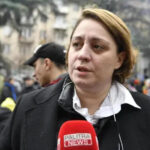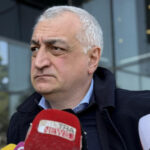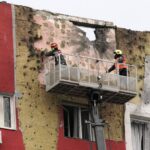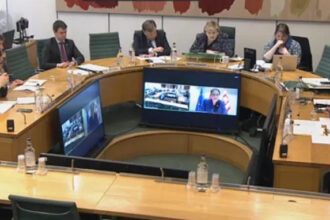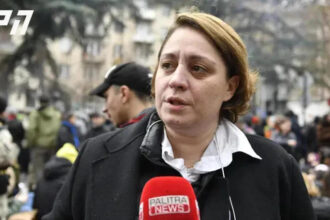We were not allowed to reveal the location for military reasons and our movements were restricted. Israeli artillery was blasting in the air when we arrived. Col Yaniv malka, the brigade commander told us that the area still had Hezbollah in it. He described “face-to face combat” between Hezbollah and his troops The buildings that were left standing had been shot through by artillery. They had missing corners and walls, and were peppered with shrapnel and gunshot holes. Two tanks sat on The level of destruction is similar to that of Gaza. Our movements on the ground were limited by the army to only a small area of the village. However, neighbouring buildings and community appeared to be unaffected from “But dozens of homes were boobytrapped.” We found booby traps and weapons when we went from house to house. I asked the army spokesman if there were any women or children present when the operation began. He said that all civilians were given ample warnings to leave. Amnesty International, a human rights group, described Israel’s evacuation notices in southern Lebanon this week as inadequate and too general. “They are morphing into combatants from civilians.” This is not defensive equipment. This is not defensive gear.”Israel says that this is why they launched their invasion of southern Lebanon. They claim that Hezbollah stockpiles and equipment along the border were planning a cross border attack similar The weapons included a large IED and an anti-personnel land mine. They also had a high-tech, night-scope. “We want to remove all the ammunition and combat equipment.” We expect that the people will return and understand that peace and freedom from terrorist control is a good thing. A previous resolution had also called for its disarmament. Neither decision was enforced. The Iran-backed militia battled Israel’s army to a standstill. Both sides have avoided and prepared for the next war for almost 20 years. Col Malka served in Lebanon during this war. “This one is unique,” he said. When I asked him why, he responded: “Because 7th October.” As we spoke, the sound of small arms fire became louder. He pointed to it. He pointed to it. Hezbollah started firing rockets at northern Israel on 8th October last year. This was the day after Hamas launched a deadly attack against southern Israel. Hezbollah’s use of civilians as shields is being accused by Israel. One commander described the ground war as an offensive operation to defend Israeli citizens – an invasion to stop an invasion, in other words.But the speed with which Israel’s forces have been moving through villages along this border may only be the first chapter in this story.Hezbollah tactics have shifted since the ground invasion began, with Israeli towns like Metula – surrounded on three sides by Lebanon – reporting a drop in direct fire from anti-tank missiles, and a rise in rockets fired out of sight from further away.The assessment of many is that Hezbollah fighters have not run away, but simply withdrawn further back into Lebanon.Israel already has four divisions lined up at this border – and a growing chorus of voices inside the country who say this is the moment, not just to push back Hezbollah, but to remake the Middle East.As the fighting near the village intensified, we were told to leave immediately, hurried out to the waiting convoy.Under the shadow of a growing conflict with Iran, Israel’s small successes along this frontier don’t change one key fact: this is not actually a border war, it’s a regional war being fought along a border.BBC Verify examines air strike patterns in BeirutIsrael attacks on UN in breach of international law, Harris saysWitness describes ‘roar then explosion’ from Israeli strikes on Beirut that killed 22IsraelHezbollahLebanon
Read More @ www.bbc.com


